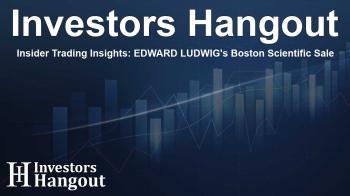Insider Trading Insights: EDWARD LUDWIG's Boston Scientific Sale

Recent Sale by Boston Scientific Director Raises Eyebrows
In a noteworthy move, EDWARD LUDWIG, the Director of Boston Scientific (NASDAQ: BSX), disclosed an insider sale that captured market attention. As part of a recent SEC filing, Ludwig sold a total of 12,000 shares, generating significant transaction value estimated at approximately $1.27 million.
Understanding the Insider Sale
In an analysis of this event, it is pivotal to note that the timing and nature of insider sales can have varied implications. Investors often scrutinize such transactions as they can signal different sentiments among company executives regarding the firm's performance and future expectations. With Ludwig’s recent sale, many are keen to interpret its potential impact on the stock's performance.
Key Financial Highlights of Boston Scientific
Boston Scientific has been gaining traction in the healthcare sector with its innovative medical devices designed for minimally invasive procedures. As reported, the company focuses on various specialties such as angioplasty, cardiac rhythm management, and interventional oncology. It’s noteworthy that international sales contribute almost half of the firm’s revenue, showcasing its global market presence.
Financial Performance Review
Revenue Growth: The company has exhibited impressive revenue growth recently, achieving a rate of 19.34% as of the last reporting period. This growth rate has outpaced many of its competitors within the healthcare field.
Profitability Metrics: Examining profitability, Boston Scientific's gross margin stands at an impressive 68.83%. This is indicative of effective cost management strategies compared to industry peers. However, the company's earnings per share (EPS) currently rests at 0.32, which is below the sector average, suggesting a need for refinement in bottom-line performance.
Debt and Valuation Analysis
Debt Management: Boston Scientific maintains a debt-to-equity ratio of 0.54, which is notably lower than the industry standard. This indicates strong financial health and prudent fiscal management.
Price Valuation Insights: The stock is currently viewed as somewhat overvalued, with a price-to-earnings (P/E) ratio of 84.62 and a price-to-sales (P/S) ratio of 9.38.
The Importance of Insider Transactions
Insider transactions, such as sales or purchases made by company executives, serve as an essential factor for investors to consider. While such movements can indicate shifts in management sentiment, it is vital to analyze these alongside other factors such as market trends and company performance metrics.
According to regulations, insiders, including directors like Ludwig, are mandated to report their transactions through filings to maintain transparency and regulatory compliance. This system allows investors to keep track of insider activity within publicly traded firms.
Interpreting Transaction Codes
Insider transactions are categorized using specific codes. Investors often focus on Form 4 filings where codes symbolize different actions: P for purchase, S for sale, C for conversions, and A for grants or awards. Understanding these codes can aid investors in interpreting insider activities.
Conclusion: The Path Forward for Boston Scientific
In light of Edward Ludwig's sale of Boston Scientific shares, along with the company’s financial performance and growth trajectory, it remains to be seen how these factors will influence investor sentiments and stock movements in the near future. Continuous monitoring of insider activities and overall market performance will be essential for an informed investment approach.
Frequently Asked Questions
What prompted Edward Ludwig's insider sale?
Insider sales can be driven by various personal and financial strategies, but specifics regarding Ludwig’s motives haven't been disclosed.
How does Boston Scientific's recent performance compare to its competitors?
Boston Scientific has outperformed many peers in terms of revenue growth, showcasing its strong market position despite challenges in profitability metrics.
What does a low debt-to-equity ratio signify for Boston Scientific?
A low debt-to-equity ratio indicates strong financial stability and effective management of resources, which can be appealing to investors.
How do insiders' transactions impact investor sentiment?
Insider transactions can significantly impact investor perceptions as they may signal confidence or concerns about a company's future performance.
What are the key areas Boston Scientific is focusing on?
Boston Scientific is primarily focused on developing less invasive medical devices and expanding its global market presence, particularly in various healthcare specialties.
About The Author
Contact Thomas Cooper privately here. Or send an email with ATTN: Thomas Cooper as the subject to contact@investorshangout.com.
About Investors Hangout
Investors Hangout is a leading online stock forum for financial discussion and learning, offering a wide range of free tools and resources. It draws in traders of all levels, who exchange market knowledge, investigate trading tactics, and keep an eye on industry developments in real time. Featuring financial articles, stock message boards, quotes, charts, company profiles, and live news updates. Through cooperative learning and a wealth of informational resources, it helps users from novices creating their first portfolios to experts honing their techniques. Join Investors Hangout today: https://investorshangout.com/
The content of this article is based on factual, publicly available information and does not represent legal, financial, or investment advice. Investors Hangout does not offer financial advice, and the author is not a licensed financial advisor. Consult a qualified advisor before making any financial or investment decisions based on this article. This article should not be considered advice to purchase, sell, or hold any securities or other investments. If any of the material provided here is inaccurate, please contact us for corrections.

